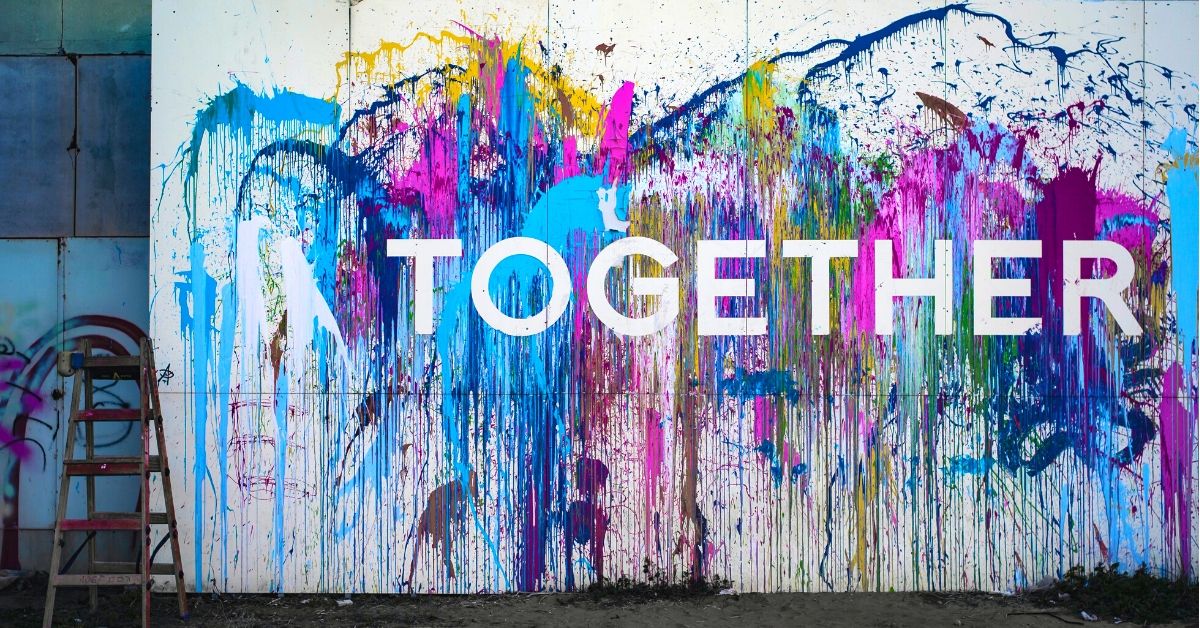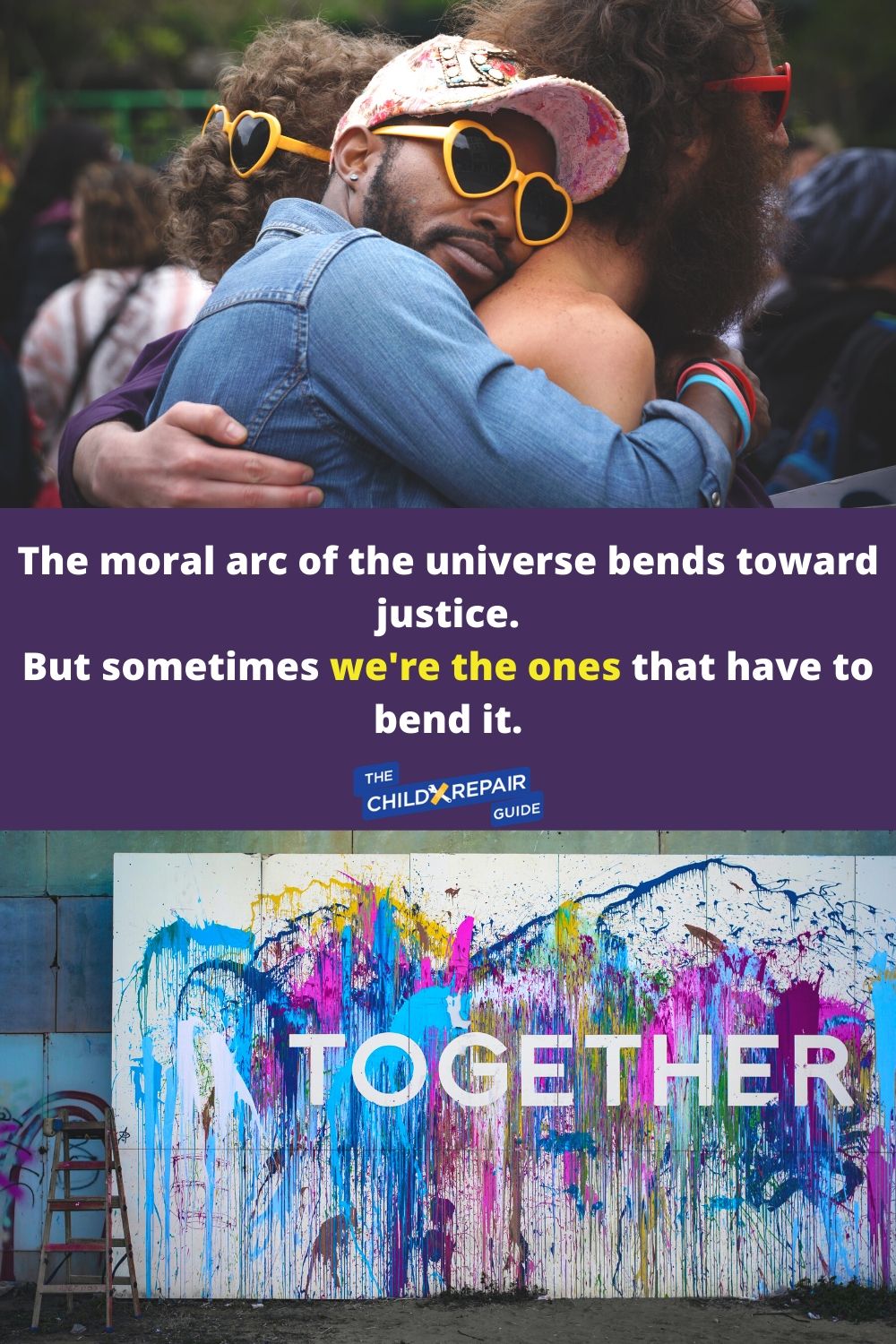We Get To Carry Each Other
Why this is the moment for change—and what we need to realize to make it happen
by Steve Silvestro, MD @zendocsteve
You can also listen to this article as a podcast on your favorite podcast app or click on the player below:
*
Like much of the country, I’ve been thinking a lot about inequality and bigotry of late, trying to put so many feelings into coherent thoughts.
And as I do, the memory of one impactful experience from when I was 19 keeps coming back to me.
I was in college taking part in a training with other students to lead small group discussions about diversity. During one exercise, our professor asked us to line up together against the wall and close our eyes. She would then call out various descriptors, and if the description applied to us, we were to take one step forward.
“Step forward if one or both of your parents graduated college.”
“…if your family never had to skip a meal because of finances.”
“…if English is your parents’ first language.”
“…if you are considered tall.”
“…if you feel safe walking in your neighborhood at night.”
“…if you are perceived as white and male.”
There were a few dozen questions, and I’m sure you can guess the intent of the exercise. As an athletic, white, working class male from the Mid-Atlantic, I found myself stepping across three-quarters of the room.
The lesson sunk in—I and the other students up in the front half of the room had benefited in society in some way because of features that were beyond our direct control.
But what has stuck with me all these years wasn’t just my own experience with this activity, but rather someone else’s. Two young women found themselves toward the front of the room and they were having none of it. “I’m offended by what you’re implying,” one of them told the professor. “My father worked hard to get our family where we are, and he did it all himself. We deserve everything we have.”
I could spend time now discussing why each of the descriptors the professor called out might give someone a leg up in American society. I could talk about unconscious bias or even outright racism and bigotry. And I could go through statistics showing how belonging to various categories or having some sort of “social head start” can play a role in an individual’s success.
But the reason my fellow student’s words have stuck with me for over twenty years is something different—it’s the sheer disconnection from the rest of humanity that those words implied.
BUMPER STICKER EGO
In the United States, our pioneer spirit runs deep. Our heroes are often “self-made” champions whose prowess and decision-making helped them rise above the rest.
But our praise for the individual so often blinds us to the roles that others play in their success.
I once saw a car with a bumper sticker that said: “Self-Reliant American.” I had to chuckle. Surely, the owner of this car didn’t personally make that bumper sticker—they didn’t print it out, first creating ink in different colors, formulating the plastic that comprised the sticker or the adhesive that stuck it to the car. And the car! Did this self-reliant person build his or her car—forging the metal, piecing it together, harvesting the rubber from rubber trees to make the tires? Or drill for oil and process it into gasoline to make the car run? Or the roads—did this individual personally build and maintain the roads upon which this car drives?
This argument might sound ridiculous—but clearly, so is the claim of being “self-reliant” anywhere but a desert island.
It’s true that personal responsibility and individual choices do matter. In life, we’re faced with endless decisions of taking this road or that one, or skipping them altogether for the subway. But sometimes we can become so focused on our own paths that we fail to recognize the web of others that weave in and out of our own.
I don’t know the story of that young woman from my college diversity exercise. I don’t know the details of her father’s life or the business he built. But if it’s true that he found some sort of financial success, I have to believe that he did so based on both his own hard work and reliance on the contributions of others to at least some inescapable degree.
WHY WE STAND TOGETHER NOW
No man or woman is an island—and it may be that our eventual collective realization of this has finally led us to where we are in this moment today.
In the wake of George Floyd’s killing, I’ve been trying to think about what inspired the response to this tragedy to be so different from those that came before. Our country has witnessed the inexcusable deaths of so many Black men and women, but never before has the whole country—the whole world—been inspired to respond with such passion and rage.
What is it about his death that has lit the fire for change?
Could it be that over these last few months, cut off from social interaction, locked up in our homes wondering when we can see loved ones again, that we’ve begun to truly appreciate how much we all mean to each other? Could it be that now seeing how much we rely on the grocery store worker, the delivery person, the hospital janitor—the people whose roles so many often forget about in touting their own “self-reliance”—that we finally realize how much we need each other?
Without a doubt, what’s angered so many is the sheer nonchalant disregard toward the life of a fellow human being—and it’s driven home how atrocious America’s social inequalities really are. The abuse of power by a police officer, the inherent and institutional racism in the act of someone meant to serve and protect—those are the root problems, yet those roots have been exposed before, too often with impermanent responses following behind.
But watching that video, hearing his cries, the inhumanity of those 8 minutes 46 seconds—no one can look away from that. In those 8 minutes 46 seconds, George Floyd is one of us, no matter the color of your skin (though more painfully so if you are Black). In the rawness of that moment, George Floyd is someone you might know. In those terrible moments, stripped down to a single human being crying out for life in the face of injustice and evil, George Floyd is you.
And yet, the harsh reality exposed in that raw, terrible moment—the reality is that if you are White, you will likely never be George Floyd.
In this moment in time when we’ve finally begun to recognize how important a role we all play in each other’s lives, it’s become so abundantly clear—and completely inexcusable—that we are treated so differently based on circumstances out of our control.
WE GET TO CARRY EACH OTHER
I often look to music when life gets challenging. The song “One” by U2 is a favorite of mine, and is often played at charity events and other occasions meant to rally communal spirit.
But its authors argue that most people don’t quite understand what the song’s message really is.
“I’m still disappointed,” says Bono, “when people hear the chorus line as ‘we’ve got to’ rather than ‘we get to carry each other.’ Because it is resigned, really. It’s not: ‘Come on everybody, let’s vault over the wall.’ Like it or not, the only way out of here is if I give you a leg up the wall and you pull me after you.” Guitarist The Edge adds: “’Get to’ is the key…’Get to’ suggests it is our privilege to carry one another. It puts everything into perspective.”
We get to carry each other. We’ve seen how true that is in the last few months.
We intricately and inescapably need each other—and so need to respect, care for, and truly value every single one of us—no matter who we are, where we come from, or the color of our skin. It’s our responsibility—and when that responsibility is so blatantly soiled, every heart aches.
We get to carry each other—and only by realizing that can we hope to someday get to a higher place as one.
Dr. Steve Silvestro is a pediatrician and consultant. He hosts The Child Repair Guide Podcast, can be found on Instagram, YouTube, and Facebook and hopes to do everything he can to put a positive dent in the universe.
DO SOMETHING
- Be ANTI-racist. Check out this amazing guide by Victoria Alexander, MEd
- Learn about your own implicit bias here
- Another great list of things you can do personally & with your family to be anti-racist: this one by kevineleven
- Change your frame of mind with the insights from ifyouarewhite.info
- Learn about the gross disparities in healthcare faced by minorities in the United States here
Share These Images on Pinterest
Music
- Akashic Records – Motivation
- People Have The Power (live)










